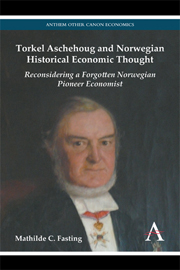 Torkel Aschehoug and Norwegian Historical Economic Thought
Torkel Aschehoug and Norwegian Historical Economic Thought Book contents
- Frontmatter
- Contents
- Acknowledgements
- Chapter 1 Introduction
- Chapter 2 Biography
- Chapter 3 Norwegian Economic and Political Context in the Nineteenth Century
- Chapter 4 Norwegian Economic Thought and Method
- Chapter 5 Development of the Economic Thought of Aschehoug: Statsøkonomisk Forening and the Socialøkonomik Project
- Chapter 6 The German Historical School: Similarities, Influences and Discrepancies
- Chapter 7 Alfred Marshall: Aschehoug and the Adoption of Marginal Theory
- Chapter 8 The French Influence: Adopting Say and Refuting Socialism
- Chapter 9 Views of Labour in the Work of Aschehoug
- Chapter 10 The Entrepreneur: The Fourth Production Factor
- Chapter 11 Trade and Customs Debates from 1840 to 1906
- Chapter 12 The Theory of Economic Crises
- Chapter 13 The Legacy of Aschehoug: Concluding Remarks
- Appendix A Other Norwegian Turn-of-the-Century Economists
- Appendix B Drafts for Socialøkonomik
- Appendix C Detailed Contents of Socialøkonomik (First Editions from 1903 to 1908)
- Notes
- Literature
- Index
Chapter 10 - The Entrepreneur: The Fourth Production Factor
Published online by Cambridge University Press: 05 March 2014
- Frontmatter
- Contents
- Acknowledgements
- Chapter 1 Introduction
- Chapter 2 Biography
- Chapter 3 Norwegian Economic and Political Context in the Nineteenth Century
- Chapter 4 Norwegian Economic Thought and Method
- Chapter 5 Development of the Economic Thought of Aschehoug: Statsøkonomisk Forening and the Socialøkonomik Project
- Chapter 6 The German Historical School: Similarities, Influences and Discrepancies
- Chapter 7 Alfred Marshall: Aschehoug and the Adoption of Marginal Theory
- Chapter 8 The French Influence: Adopting Say and Refuting Socialism
- Chapter 9 Views of Labour in the Work of Aschehoug
- Chapter 10 The Entrepreneur: The Fourth Production Factor
- Chapter 11 Trade and Customs Debates from 1840 to 1906
- Chapter 12 The Theory of Economic Crises
- Chapter 13 The Legacy of Aschehoug: Concluding Remarks
- Appendix A Other Norwegian Turn-of-the-Century Economists
- Appendix B Drafts for Socialøkonomik
- Appendix C Detailed Contents of Socialøkonomik (First Editions from 1903 to 1908)
- Notes
- Literature
- Index
Summary
Before Aschehoug, the entrepreneur (Unternehmer in German, driftsherre in Norwegian) had a clear foothold in Norwegian economics. Looking back at the structure of Norwegian economic activity during the nineteenth century, it is not surprising that the theory of the role of the entrepreneur had a considerable impact on economic thought and economic policy. This chapter demonstrates that the idea of the entrepreneur as the fourth production factor came to Norway through the works of Jean-Baptiste Say, and that Aschehoug adopted his views and those of Schweigaard, and further developed these in his work. After Aschehoug, the idea of the entrepreneur as a fourth production factor gradually disappeared from textbooks. This was mainly because the role of the entrepreneur became that of the manager, henceforth just a figure in business economics and subsequently not a part of macroeconomic analysis. Another point of interest is that the theory of the entrepreneur is firmly grounded on the idea of private initiative and also on private ownership. With a reference to the kind of economic activity that a municipality would undertake, Aschehoug asserts that economic activities with the goal of making money should be left to private entrepreneurs. I believe this statement underlines what kind of perspective he had on the importance of this production factor.
Schweigaard had emphasized the importance of management and, following Say, he split the national product between the four income sectors: wages, capital interest, rent and entrepreneurial income.
- Type
- Chapter
- Information
- Torkel Aschehoug and Norwegian Historical Economic ThoughtReconsidering a Forgotten Norwegian Pioneer Economist, pp. 153 - 164Publisher: Anthem PressPrint publication year: 2013


